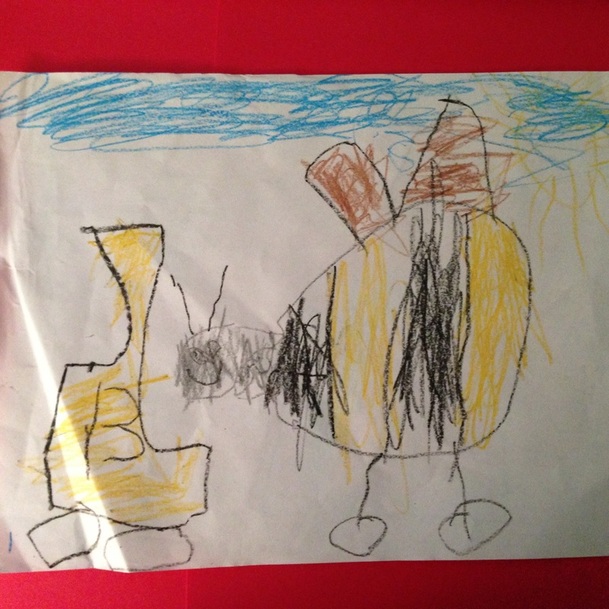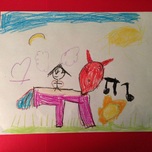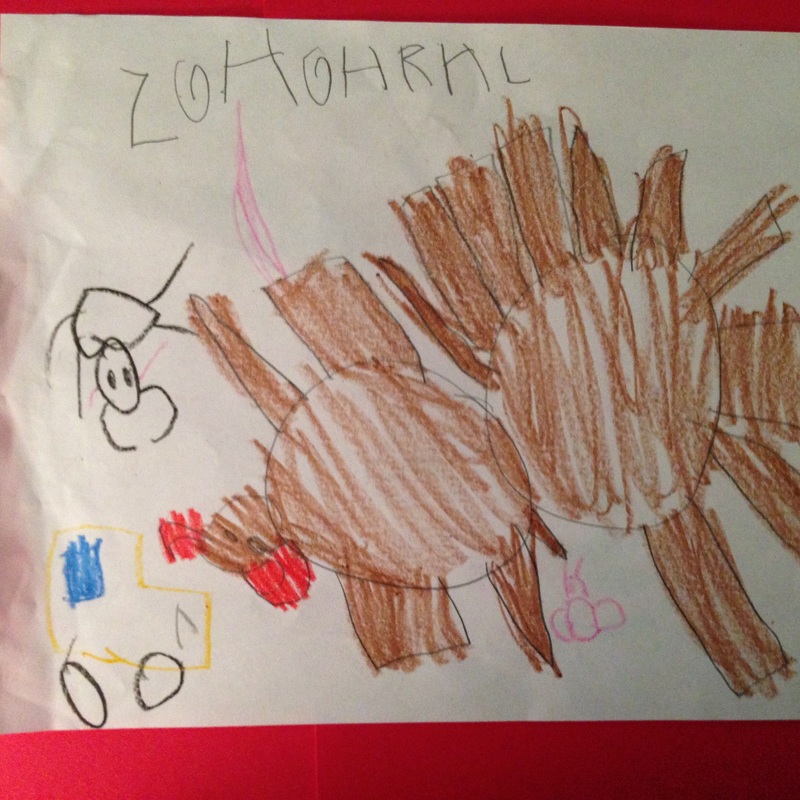 This writer decided to make his main character a very busy bumblebee. This is his illustration of the bumblebee getting on the school bus!
This writer decided to make his main character a very busy bumblebee. This is his illustration of the bumblebee getting on the school bus! My two colleagues and I, who attended the Joan Oates Institute together this past summer, were greatly motivated to not only bring arts integration to our students, but to also inspire, support, and celebrate our faculty and staff as we began this school year. Our fervent hope was to throw open the doors leading to a journey brimming with possibilities for our entire school family. As our first outreach, we asked each teacher to give us one word that held the power of inspiration for him or for her. We took each word and created a "Wordle". And then we had team shirts made with that "Wordle" front and center! When we wear our shirts, we proudly proclaim that we are more! We are what moves us and inspires us. It is powerful.
My word was "VOICE" !!!!!
A writer's voice is what captures a reader's attention. Voice infuses the personality of the writer into the written word. And every single student that walks through our classroom doors has voice! It is our job to help the student writer discover, unearth, expose, believe in, trust, and celebrate his or her author's voice. I recently read a baseline writing prompt written by a student with autism. The piece was short and had taken this student a long time and several attempts to complete. But, when he used the word "hilarious", he had me! That is VOICE. That is what we want to hear!
Having taught elementary writing all the way through fifth grade, I worry that as we concentrate so much on prompt writing, brought on in large part by state assessment requirements, we are quieting the voices of our student writers. When we remove choice from the writer's workshop, and teach only to prompts or specific journal assignments or basal activities, we may not be providing opportunities for our students to express the joy, the excitement, the intuitive point of view inherent in topics of their own choosing.
So, that being said, here I am, leading an author study in kindergarten based on The Very Hungry Caterpillar, by Eric Carle. Part of me (a great big part of me) thought I should read several books by Eric Carle and let the students choose which one they felt most inspired by to use as a model for their own picture book. I'm still not sure that isn't what I should have tried.
However, I have to keep reminding myself that these are kindergartners! They do not write many words, yet. They do not write sentences, yet. They are just learning what "story" means. To offer them too many choices, I believe, leaves some kindergarten students overwhelmed and unsure of themselves. We must provide them with a context for writing in our classroom. Many of them have come to us with none.
But guess what they do come to us with? VOICE!! Yeah, that's right!!!
And, even more importantly, those who are ready to move beyond using our mentor text as a model are doing just that! As we notice students moving beyond the text, we teach in to what's happening with those writers. We celebrate their originality and risk-taking, even as we continue to offer structure and support to those students who need it.
And student VOICE is everywhere :)
My word was "VOICE" !!!!!
A writer's voice is what captures a reader's attention. Voice infuses the personality of the writer into the written word. And every single student that walks through our classroom doors has voice! It is our job to help the student writer discover, unearth, expose, believe in, trust, and celebrate his or her author's voice. I recently read a baseline writing prompt written by a student with autism. The piece was short and had taken this student a long time and several attempts to complete. But, when he used the word "hilarious", he had me! That is VOICE. That is what we want to hear!
Having taught elementary writing all the way through fifth grade, I worry that as we concentrate so much on prompt writing, brought on in large part by state assessment requirements, we are quieting the voices of our student writers. When we remove choice from the writer's workshop, and teach only to prompts or specific journal assignments or basal activities, we may not be providing opportunities for our students to express the joy, the excitement, the intuitive point of view inherent in topics of their own choosing.
So, that being said, here I am, leading an author study in kindergarten based on The Very Hungry Caterpillar, by Eric Carle. Part of me (a great big part of me) thought I should read several books by Eric Carle and let the students choose which one they felt most inspired by to use as a model for their own picture book. I'm still not sure that isn't what I should have tried.
However, I have to keep reminding myself that these are kindergartners! They do not write many words, yet. They do not write sentences, yet. They are just learning what "story" means. To offer them too many choices, I believe, leaves some kindergarten students overwhelmed and unsure of themselves. We must provide them with a context for writing in our classroom. Many of them have come to us with none.
But guess what they do come to us with? VOICE!! Yeah, that's right!!!
And, even more importantly, those who are ready to move beyond using our mentor text as a model are doing just that! As we notice students moving beyond the text, we teach in to what's happening with those writers. We celebrate their originality and risk-taking, even as we continue to offer structure and support to those students who need it.
And student VOICE is everywhere :)
This coming week week we will continue to study our mentor text, The Very Hungry Caterpillar, and base our stories, as needed, on the structures Eric Carle used, including the days of the week and growing numbers. I will work with the student writers as they each compose a repeating phrase for their stories, building on the "..but he was still hungry." line in Carle's book. And we will, perhaps, try to tell our stories, one day at a time - both literally and literally. While this may seem a bit too structured and dictated, in my heart I know that it really is a foundation, a net, a place to begin for most of our young writers. I want them to discover their voices and play with their stories in an environment that inspires them.
It is powerful.
#allkidshavevoice
#allkidscanwrite
It is powerful.
#allkidshavevoice
#allkidscanwrite


 RSS Feed
RSS Feed
